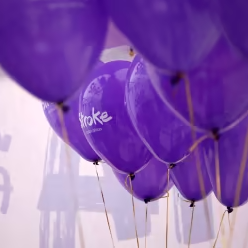
Press release -
Stroke Association partners with LoSalt® in bid to cut nation’s blood pressure
Stroke Association partners with LoSalt® in bid to cut nation’s blood pressure
The Stroke Association and LoSalt® have today launched a new partnership aimed at encouraging people to lower the risk of stroke and other serious health conditions.
With the nation in lockdown, the first of the #HealthierUK “nudges” is to cut down salt consumption.
There are 1.2 million stroke survivors living in the UK today, a number which the charity expects to double by 2035(i). High blood pressure is one of the biggest risk factors of stroke believed to triple the risk of stroke. There are 9.5 million people in the UK diagnosed as having high blood pressure, also known as hypertension(ii). It’s estimated that for every 10 people diagnosed with high blood pressure, seven remain undiagnosed and untreated(iii).
According to the Stroke Association, the UK’s leading stroke charity, four out of five strokes can be prevented if people monitored and managed their blood pressure regularly.
The Stroke Association is urging people to cut down their salt intake or consider switching to LoSalt®, which has two thirds less sodium than regular table, sea and rock salt without any taste compromise.
Juliet Bouverie, the charity’s chief executive, said: “High blood pressure is preventable, and can be reduced by reducing your sodium intake. Our primary source of sodium is salt, so reducing our salt intake will reduce incidence of high blood pressure and therefore stroke. Stroke is the fourth biggest killer in the UK and the UK’s leading cause of disability, so we need to do everything that we can to avoid unnecessary death and disability.
“Ideally, everyone should cut down or even stop adding salt to their food. But we know that many people would find this really hard because they like the enhanced flavour that salt can provide. If that’s the case then people need to know that there is an alternative to regular salt.
“The aim of the partnership with LoSalt® is to use our combined strengths to create a “#HealthierUK”, by making more people aware of the options that are available to them. The more information people have about the risks they might be taking with their health and how to minimise them, the better equipped we all are to make the right choices for our wellbeing.
“You can help to reduce your risk of a stroke by making some healthy lifestyle choices. Whether it’s your diet, activity levels, stopping smoking or cutting down on alcohol, it’s never too late to make a change.
“Many of these are difficult to do at the moment but, with mealtimes currently being the highlight of the day for most of us, we can use a little less salt or switch to LoSalt®.”
It is important to note that if you take some types of medication that affect potassium levels, LoSalt® and other reduced sodium salt alternatives may not be suitable for you. This includes people receiving medication for diabetes, heart or kidney disorders. Check with your GP for advice.
The #HealthierUK initiative will be launched with recipes using LoSalt® on the charity’s website and a special online cook-a-long by celebrity chef Sally Bee on Facebook on Thursday 30 April at 11am.
Over time, as the lockdown lifts, stroke survivors, carers and everyone else in the charity’s community will be encouraged to share their own tips and ideas for small changes that make a big difference.
GP Dr Sarah Jarvis, medical advisor to LoSalt®, said: “Sugar isn’t the only danger in our diet we need to be aware of, it’s important we don’t forget the issue of excess salt.
“In the UK we are still eating far too much salt, which worries me greatly, and is why the partnership between LoSalt® and the Stroke Association is so important. The #HealthierUK initiative will continue to help educate people on why cutting down on salt is important for preventing high blood pressure, as well as overall health.
“If you can’t cut salt completely from your diet, which is a big ask, switching to reduced sodium alternatives such as LoSalt® and making other easy lifestyle changes can help reduce your salt intake. Simple measures such as cutting down on ready-made foods and not being duped into thinking posh gourmet salts, such as sea and rock salts, are any better for you, will better equip you for looking after your blood pressure and overall health.
“Remember, high blood pressure is very common, often has no symptoms and usually affects people as they get older, so it’s important you attend any regular NHS health checks you’re invited too. These check-ups can help detect early signs of both high blood pressure and stroke.”
For more details on the partnership and stroke prevention visit www.stroke.org.uk/healthierUK
Captions:
- Juliet Bouverie, chief executive of the Stroke Association
- GP Dr Sarah Jarvis, medical advisor to LoSalt®
ENDS
For more information, please contact Martin Oxley on 0207 940 1358 or email martin.oxley@stroke.org.uk
For more information on LoSalt®, please contact Taryn Glenister / Kathryn Race on 01189 475 956 or email losalt@ceres-pr.co.uk
Editor’s Notes
About sodium and salt
Sodium is a mineral that is essential for life. It’s regulated by your kidneys, and it helps control your body’s fluid balance. It also helps send nerve impulses and affects muscle function. When there’s extra sodium in your bloodstream, it pulls water into your blood vessels, increasing the total amount (volume) of blood inside them. With more blood flowing through your blood vessels, blood pressure increases. High blood pressure increases the risk of heart failure, coronary artery disease and stroke, as well as increasing the risks of chronic kidney disease, peripheral arterial disease and vascular dementia.
As salt is out biggest source of sodium, reducing the amount of salt we eat will reduce the risk of developing high blood pressure.
The World Health Organisation (WHO) recommends a reduction in sodium intake to reduce blood pressure and risk of cardiovascular disease, stroke and coronary heart disease in adults. WHO recommends a reduction to less than 2 grams per day of sodium (5g/day salt) in adults.
About the research
(i), (ii), (iii) Stroke Association, State of the Nation Stroke statistics February, 2018.
About LoSalt®
- All the taste of regular table, sea and rock salts with 66% less sodium
- The leading brand of reduced sodium salt in the UK
- Manufactured in Scotland, Klinge Foods Ltd expertly blends two natural mineral salts (potassium chloride and sodium chloride) to produce LoSalt®.
- Excess levels of sodium in our diet (the main source being salt) is linked to high blood pressure (hypertension), a major risk factor for heart disease and stroke. Not enough potassium in the diet is also a contributor to hypertension
- At a population level, the potential benefits of using potassium-based sodium replacers to help reduce sodium in foods outweigh the potential risks (SACN-COT report, Nov. 2017). An increased potassium intake may reduce blood pressure, decrease risk of cardiovascular disease, have beneficial effects on bone-mineral density, and mitigate the negative consequences of high sodium consumption (World Health Organisation, Potassium intake for adults and children report, 2012).
Topics
- Stroke strikes every five minutes in the UK and it changes lives in an instant.
- The Stroke Association is a charity working across the UK to support people to rebuild their lives after stroke. We believe that everyone deserves to live the best life they can after stroke. From local support services and groups, to online information and support, anyone affected by stroke can visit stroke.org.uk or call our dedicated Stroke Helpline on 0303 3033 100 to find out about support available locally.
- Our specialist support, research and campaigning are only possible with the courage and determination of the stroke community and the generosity of our supporters. With more donations and support, we can help rebuild even more lives.
- You can follow us on Twitter, Facebook and Instagram.











